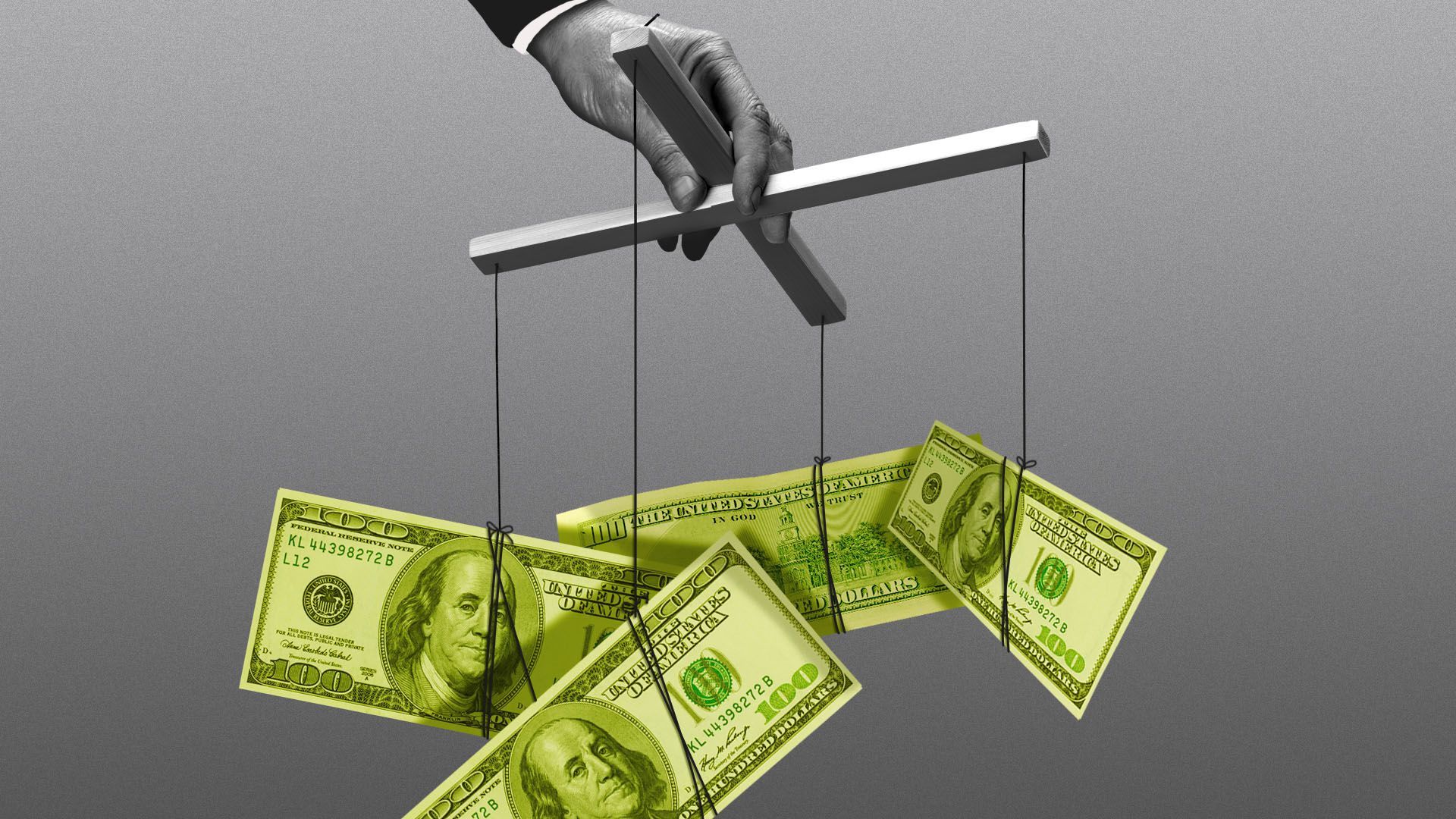| | | | | | | Presented By Babbel | | | | Axios Markets | | By Emily Peck and Matt Phillips · Jul 06, 2022 | | 🐪 Oh hi! Emily again. We've got some good stuff for you today, including a bit on some apparently unconscious uncoupling, contra the Gwyneth Paltrow experience. - But first, did you know there was an emoji for an interrobang‽‽‽ I only learned this yesterday. So things are happening around here, safe to say.
Today's newsletter, edited by Kate Marino, is 1,141 words, 4.5 minutes. | | | | | | 1 big thing: States' inflation aid |  | | | Illustration: Sarah Grillo/Axios | | | | An inflation quandary for political leaders: Do you help people absorb rising prices, or do you attempt to fight the root causes? Why it matters: The first option could have a counterproductive effect on the second, Kate writes. Driving the news: Some states are touting "inflation relief" checks for residents — effectively amounting to fiscal stimulus — to help them deal with rising prices. - California is offering checks of up to $1,050 to individual taxpayers, as part of a $17 billion relief package signed last week, with more money going to those with lower incomes.
- With state government coffers strong, places like Colorado, Indiana, Maine and Delaware are offering similar, smaller programs, mostly structured around tax rebates and enacted by both Democratic and Republican leaders.
The big picture: The Federal Reserve is the main cop on the inflation beat right now. Chair Jerome Powell has said as much, shouldering the responsibility for reversing it; President Biden has separately voiced the same. - But the Fed's tools are blunt. In the supply and demand equation, they don't have any control over the snarled supply chains that lead to scarcity and higher prices. All the Fed can do is cool demand.
- Yet these states appear to be undermining the Fed's efforts — drawing up plans to send more dollars into the economy to create more demand.
State of play: If the number of states sending out inflation rebates remains low, it's unlikely to create an inflationary jump for the U.S. as a whole, says Sonal Desai, fixed income CIO at Franklin Templeton. - But at scale, that would start to change. "If you see most states going in this direction, it makes the whole job of controlling inflation that much harder," she adds.
The other side: A spokesperson for Delaware's Department of Finance tells Axios that if the cash the state's sending to residents were to, instead, be funneled into things like construction projects, then that could negatively impact inflation by worsening the supply problems. The bottom line: Most Americans probably don't closely study things like the economics of fiscal stimulus, or how the Fed's dual mandate works. - But they do know that inflation is making things harder for them. About 15% of California renters are behind on rent, and half of those say they're likely to face eviction, Gov. Gavin Newsom's budget spokesperson says.
- Many states have budget surpluses this year — so it shouldn't be surprising that leaders (many of whom will seek reelection at some point) are looking to offset the pain.
Go deeper: San Francisco Fed president Mary Daly speaks to Axios Macro about those inflation relief checks. |     | | | | | | 2. Catch up quick | | 🛢 Oil prices claw back some of Tuesday's losses. (Reuters) 🛑 Crypto broker Voyager files Chapter 11. (Bloomberg) 🍨 Ben & Jerry's sues Unilever to block sale of its Israeli business. (WSJ) |     | | | | | | 3. The great decoupling |  | | | Illustration: Lindsey Bailey/Axios | | | | Up until 2020, Americans' view of the economy was deeply connected to the unemployment rate. The pandemic weakened that tie, finds a new working paper, Emily writes. Why it matters: The paper, titled "The Great Decoupling" sheds light on a vibe that many are puzzling over but isn't yet well understood: Why are people so unhappy with the economy — despite the low unemployment rate. - Lately, the blame's landed on record-high inflation. But this paper complicates that view.
Backstory: Prior to 2020, any time the unemployment rate went up, Americans would grow more pessimistic about the economy. When the rate fell, and more people got jobs, we'd get more positive. - Those were the findings of a 2014 paper, published by Darren Grant, an economist at Sam Houston State University.
- He compiled data from surveys of Americans' perceptions of the economy, dating back to the 1970s, and then examined how those polls connected with indicators like unemployment and inflation.
These surveys were in sync with those indicators — even predictive of later revisions to government numbers. "Consumer perceptions have been quite sensible over the years," Grant tells Axios. What's new: Grant updated his research this year — bringing his massive spreadsheet up to date — to see if anything had changed. It had. - "The public really isn't taking unemployment into account nearly like they used to," he says.
- Grant hypothesizes the massive amount of cash the federal government sent out to alleviate the impact of the COVID economic shutdown played a big role.
The bottom line: It's not surprising that those transfers would "somewhat decouple" economic sentiment from macroeconomic conditions, Grant writes. - "The greater surprise," he writes, "is the ferocity of the decoupling, which is very large in historical terms and, as of this writing, still ongoing."
|     | | | | | | A message from Babbel | | Start speaking a new language in just 3 weeks | | |  | | | | Babbel helps millions of people speak and understand a new language through its scientifically proven teaching method. The deets: The platform offers multiple ways to learn a language through daily lessons, podcasts, games, live online classes and more. Get up to 60% off your subscription. | | | | | | 4. 50-year mortgages‽ |  | | | Illustration: Aïda Amer/Axios | | | | In the United Kingdom there's talk of lengthening the loan terms on mortgages to 40 or 50 years, as a way of making homes more affordable, Emily writes. The big picture: In the U.S. — which has an affordability problem of its own — no one is talking about this. We already took this kind of step back in the New Deal, in establishing 30-year mortgages — vastly expanding access to homeownership (among white Americans). - Before the government took these steps to back mortgages, terms on home loans were around five years, notes this good overview from Marketplace from 2018.
- The 30-year loan became even more appealing after Fannie and Freddie were established in the 1970s, and started buying mortgages from banks that no longer had to hold on to that risk for decades.
State of play: Forget 50 years, the U.K. doesn't even do 30-year fixed mortgages. Rates are typically fixed for only two or five years and then float (meaning payments will go up as rates rise) — for terms as long as 25 years. - There's no Fannie or Freddie out there supporting the market, though there's increasing talk of moving in that direction, as Bloomberg reported. The 50-year loan is part of the conversation.
- The notion of such a long loan term is not unheard of — Japan started doing 100-year mortgages decades ago, it's a way for parents to pass on wealth without burdening the next generation with higher inheritance taxes.
Zoom in: There are more practical reasons that a half-century mortgage wouldn't be the best way to expand affordability in the U.S. or anywhere else, really... - Borrowers would pay more. The advantage to a longer loan term is lower monthly payments, but ultimately you'd pay more in interest.
- They'd also build less equity: If you have a 50-year loan on a $400,000 house you'd have $110,000 of equity after 30 years, according to calculations by the Mortgage Bankers Association. If you had a 30-year loan, you'd own the house.
- Plus, typically when home payments go down, it allows prices to rise.
The bottom line: Better than messing with mortgages, most housing observers here (and in the U.K.) believe actually building more homes would be a better way to increase affordability. |     | | | | | | A message from Babbel | | Get conversational in a new language | | |  | | | | Babbel offers bite-sized, 10-minute language lessons developed by over 150 linguists and voiced by native speakers. The impact: Users report being able to have a basic conversation after just three weeks of daily practice using Babbel. For a limited time, get up to 60% off your subscription. | | | | ⚡️ 1 thing Emily feels complicated about: shopping malls. As a child of the 80s, I lived at the mall. But like lots of other Americans, I grew out of my fixation. But I just finished reading "Meet Me by the Fountain: An Inside History of the Mall," by Alexandra Lange, and it made me sort of nostalgic for the days roaming the Spencer Gifts and the food court. Lange has said people loved telling her about their own hometown malls. So, in the meantime, feel free to share your mall memories by replying to this email. |  | It's called Smart Brevity®. Over 300 orgs use it — in a tool called Axios HQ — to drive productivity with clearer workplace communications. | | | | | | Axios thanks our partners for supporting our newsletters. If you're interested in advertising, learn more here.
Sponsorship has no influence on editorial content. Axios, 3100 Clarendon Blvd, Arlington VA 22201 | | | You received this email because you signed up for newsletters from Axios.
Change your preferences or unsubscribe here. | | | Was this email forwarded to you?
Sign up now to get Axios in your inbox. | | | | Follow Axios on social media:    | | | | | |







No comments:
Post a Comment